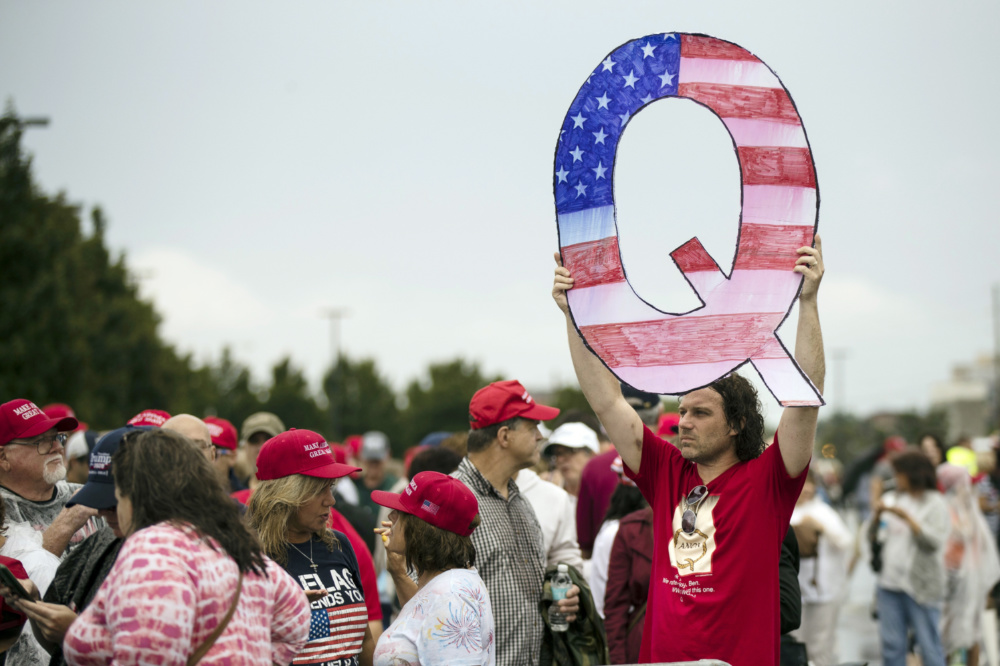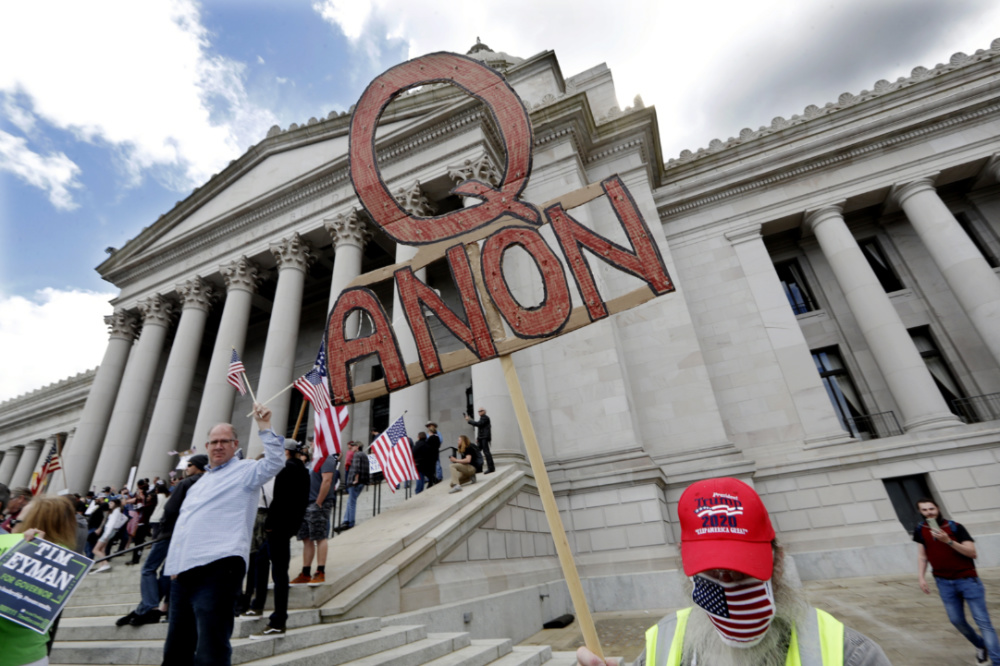
In an article first published on Religion News Service, KATELYN BEATTY, a former managing editor of Christianity Today and author of ‘A Woman’s Place’, looks at the rise of QAnon…
Via RNS
It’s a rough time to be a pastor. An election year, national racial unrest and a global pandemic each challenged the usual methods of ministry. Taken together, many church leaders are facing the traditional post-vacation ingathering season with a serious case of burnout.
But there’s another challenge that pastors I spoke with say is on the rise in their flocks. It is taking on the power of a new religion that’s dividing churches and hurting Christian witness.

In this 2nd August, 2018, file photo, David Reinert holds a Q sign as he waits in line with others to enter a campaign rally with President Donald Trump in Wilkes-Barre, Pennsylvania. PICTURE: AP Photo/Matt Rourke/File photo.
Mark Fugitt, senior pastor of Round Grove Baptist Church in Miller, Missouri, recently sat down to count the conspiracy theories that people in his church are sharing on Facebook. The list was long. It included claims that 5G radio waves are used for mind control; that George Floyd’s murder is a hoax; that Bill Gates is related to the devil; that masks can kill you; that the germ theory isn’t real; and that there might be something to Pizzagate after all.
“You don’t just see it once,” said Fugitt. “If there’s ever anything posted, you’ll see it five to 10 times. It’s escalating for sure.”
“Conspiracy theories – grand narratives that seek to prove that powerful actors are secretly controlling events and institutions for evil purposes – are nothing new in the US. But since 2017, a sort of ur-conspiracy theory, QAnon, has coalesced in online forums and created millions of believers.”
Conspiracy theories – grand narratives that seek to prove that powerful actors are secretly controlling events and institutions for evil purposes – are nothing new in the US. But since 2017, a sort of ur-conspiracy theory, QAnon, has coalesced in online forums and created millions of believers. “To look at QAnon is to see not just a conspiracy theory but the birth of a new religion,” wrote Adrienne LaFrance in The Atlantic in June.
Named after “Q,” who posts anonymously on the online bulletin board 4chan, QAnon alleges that President Donald Trump and military officials are working to expose a “deep state” paedophile ring with links to Hollywood, the media and the Democratic Party. Since its first mention some three years ago, the theory has drawn adherents looking for a clear way to explain recent disorienting global events.
Once the fascination of far-right commentators and their followers, QAnon is no longer fringe. With support from Trump and other elected officials, it has gained credibility both on the web and in the offline world: In Georgia, a candidate for Congress has praised Q as “a mythical hero”, and at least five other congressional hopefuls from Illinois to Oregon have voiced support.
One scholar found a 71 per cent increase in QAnon content on Twitter and a 651 per cent increase on Facebook since March.
Jon Thorngate is the pastor at LifeBridge, a non-denominational church of about 300 in a Milwaukee suburb. In recent months, he said, his members have shared Plandemic, a half-hour film that presents COVID-19 as a money-making scheme by government officials and others, on Facebook. Members have also passed around a now-banned Breitbart video that promotes hydroxychloroquine as a cure for the virus.
Thorngate, one of the few pastors who would go on the record among those who called QAnon a real problem in their churches, said that only five to 10 members are actually posting the videos online. But in conversations with other members, he’s realised many more are open to conspiracy theories than those who post.
Thorngate attributes the phenomenon in part to the “death of expertise” – a distrust of authority figures that leads some Americans to undervalue long-established measures of competency and wisdom. Among some church members, he said, the attitude is, “I’m going to use church for the things I like, ignore it for the things I don’t and find my own truth.
“That part for us is concerning, that nothing feels authoritative right now.”
For years in the 1980s and ’90s, US evangelicals, above nearly any other group, warned what will happen when people abandon absolute truth (which they located in the Bible), saying the idea of relative truth would lead to people believing whatever confirms their own inward hunches. But suspicion of big government, questioning of scientific consensus (on evolution, for example) and a rejection of the morals of Hollywood and liberal elites took hold among millennial Christians, many of whom feel politically alienated and beat up by mainstream media. They are natural targets for QAnon.
There’s no hard data on how many Christians espouse QAnon. But Ed Stetzer, executive director of the Billy Graham Center at Wheaton College, noted that distrust of mainstream news sources “can feed a penchant for conspiracy theories”.
A 2018 poll from BGC found that 46 per cent of self-identified evangelicals and 52 per cent of those whose beliefs tagged them as evangelical “strongly agreed that the mainstream media produced fake news”. It also found that regular church attendance (at least once a month) correlated to believing that mainstream media promulgates fake news (77 per cent compared with 68 per cent of those who attend less regularly).

A demonstrator holds a “Q Anon” sign as he walks at a protest opposing Washington state’s stay-home order to slow the coronavirus outbreak on Sunday, 19th April, in Olympia, Washington. PICTURE: AP Photo/Elaine Thompson/File photo.
Jared Stacy said the spread of conspiracy theories in his church is particularly affecting young members. The college and young adult pastor of Spotswood Baptist Church in Fredericksburg, Virginia, Stacy said some older members are sharing Facebook content that links the coronavirus to Jeffrey Epstein and secret paedophile rings. He says his and other pastors’ job is to teach that conspiracy theories are not where Christians should find a basis for reality.
“My fear…is that Jesus would not be co-opted by conspiracy theories in a way that leads the next generation to throw Jesus out with the bathwater,” Stacy said, “that we’re not able to separate the narrative of taking back our country from Jesus’ kingdom narrative.”
Others are concerned the theories will become grounds for more mistrust.
“Young people are exiting the church because they see their parents and mentors and pastors and Sunday school teachers spreading things that even at a young age they can see through,” said Jeb Barr, the senior pastor of First Baptist Church of Elm Mott outside Waco, Texas. He said conspiracy theories are “extremely widespread and getting worse” among his online church networks.
“Why would we listen to my friend Joe…who’s telling me about Jesus who also thinks that Communists are taking over America and operating a pedophile ring out of a pizza restaurant?…Why would we be believed?”
But Barr and other pastors I spoke with are reticent to police church members’ social media conduct. Instead, they try to teach broader principles. “Christians are meant to be agents of hope, to be peacemakers; the Bible says we’re not to be quarrelsome,” said Barr. “We’re not to be the ones spreading fear and division and anger.”
Barr also teaches critical thinking skills and encourages his members to read “boring news’. He will recommend news sources that are credible.
But teaching media literacy isn’t enough, precisely because QAnon thrives on a narrative of media cover-up.
Fugitt said it’s not effective to tell conspiracy spreaders that what they are sharing online is false.
“Nobody joins a cult. I don’t think anybody shares a conspiracy theory either because they believe it’s truth.” Rather, he tries to address the dehumanising language of QAnon theories that equate certain people with evil. History is replete with examples of where such language can lead.
“I can’t hate another person, but, boy, if I can make them less than human, that’s the Crusades, that’s Jewish persecution throughout history, that’s racial issues hand over fist there.”
In a fraught political moment, the pastors I spoke with worried that taking on QAnon, by addressing politics directly, would divide the church.
But QAnon is more than a political ideology. It’s a spiritual worldview that co-opts many Christian-sounding ideas to promote verifiably false claims about actual human beings.
“QAnon is more than a political ideology. It’s a spiritual worldview that co-opts many Christian-sounding ideas to promote verifiably false claims about actual human beings.”
QAnon has features akin to syncretism – the practice of blending traditional Christian beliefs with other spiritual systems, such as Santeria. Q explicitly uses Bible verses to urge adherents to stand firm against evil elites. One charismatic church based in Indiana hosts two-hour Sunday services showing how Bible prophecies confirm Q’s messages. Its leaders tell the congregation to stop watching mainstream media (even conservative media) in favour of QAnon YouTube channels and the Qmap website.
And it’s having life-and-death effects: It’s hampering the work of anti-sex trafficking organisations. The FBI has linked it to violence and threats of violence. And its adherents are downplaying the threat of COVID and thus putting others’ lives at risk.
The earliest Christians contended with syncretism in the form of Gnosticism, which blended elements of Greek philosophy and Zoroastrianism with Christianity, emphasising the good-evil spirit-flesh divide as well as secret divine knowledge (Greek: gnosis is “knowledge”). Early church fathers such as Irenaeus and Tertullian battled Gnostic ideas, rejecting them as heresy.
At a time when church leaders are having to host digital church and try to meet members’ needs virtually, the idea of adding “fight heresy” to their to-do list might sound exhausting. But a core calling of church leaders is to speak the truth in love. It’s not loving to allow impressionable people to be taken in by falsehood. Nor is it loving to allow them to spread falsehood and slander to others.
“Conspiracy theories thrive on a sort of cynicism that says, ‘We see a different reality that no one else sees,’” said Stacy. “Paul says to take every thought captive – addressing conspiracy theories is part of that work.”
Katelyn Beaty is a former managing editor of Christianity Today and the author of A Woman’s Place: A Christian Vision for Your Calling in the Office, the Home, and the World.






